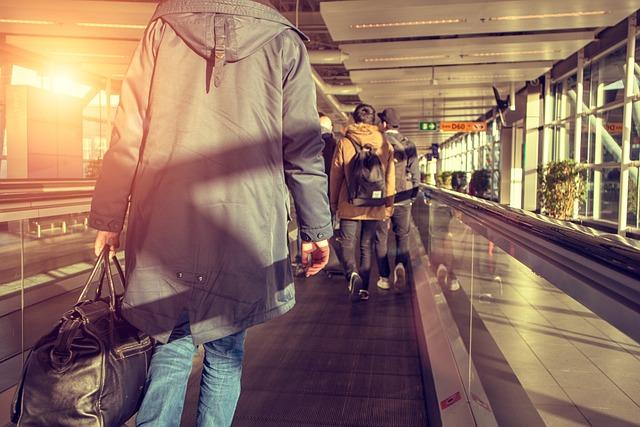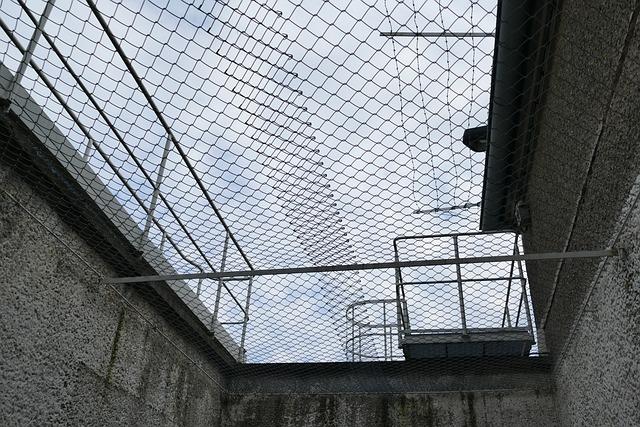Title: U.S. Detention of European and Canadian Tourists Sparks Fears Over American Travel
In recent months, reports of teh detention of European and Canadian tourists at U.S. borders have raised significant concerns about the safety and legality of traveling to the United States. Instances of travelers being subjected to lengthy questioning, detainment, and even deportation have emerged, shining a spotlight on the increasingly stringent border security measures and their impact on international tourism.As tensions surrounding immigration policies continue to escalate, many potential visitors from Europe and Canada are now grappling with anxiety and uncertainty about their travel plans.This article delves into the incidents that have ignited fears among prospective tourists, explores the implications for the U.S. tourism industry, and examines how these developments may reshape perceptions of travel to America in a post-pandemic world.
Impact on International Tourism and Relations
The recent incidents involving the detention of European and canadian tourists at U.S. border checkpoints have stirred significant concern regarding travel to America. Many potential visitors are now faced with uncertainty, leading to a notable decline in interest for leisure travel. The implications extend beyond individual vacations; they impact international tourism agencies, airlines, and related businesses that thrive on transatlantic travel. The hesitance stems from the fear of encountering unwarranted scrutiny or detention, which could deter not only tourists but also business travelers and diplomats committed to fostering international relations.
This situation poses a challenge for the U.S. as it seeks to maintain strong diplomatic ties with allied nations.in light of increased tensions, stakeholders in the tourism industry are facing pressures to advocate for clarity and protective measures to reassure international travelers. some key considerations include:
- Enhanced Communication: Governments must convey clear guidelines on travel regulations to avoid misunderstandings.
- Travel Advisory Updates: Continuous updates regarding the safety and legal implications of traveling to the U.S. are critical.
- International Collaboration: Partnering with foreign governments to ensure mutual understanding of visa and travel requirements.
As the international community watches closely, the U.S. has the prospect to demonstrate its commitment to welcoming global tourists while safeguarding national security. The recent developments could reshape the landscape of international travel, making it imperative for the U.S. to balance security measures with hospitality in an increasingly interconnected world.

Legal Ramifications of Detention practices
The legal implications of detention practices at U.S. borders have raised significant concerns among international travelers, especially those from Europe and Canada. Tourists often find themselves subjected to lengthy questioning and searches that extend beyond the typical customs procedures. These measures, justified under national security and immigration enforcement, can lead to various legal challenges, including claims of unlawful detention and violations of due process. An alarming trend has emerged, indicating that the uncertainty surrounding these practices is pushing potential visitors to reconsider their travel plans to the United States.
Furthermore, the potential for civil lawsuits looms on the horizon, as travelers feeling aggrieved by their treatment may seek redress in courts. Legal experts suggest that the following issues are prominent:
- Inadequate legal depiction: Many detainees may not have access to legal advice during their interactions with border officials.
- Racial and ethnic profiling: There are claims that certain nationalities are disproportionately targeted, raising concerns about discrimination.
- Consistent enforcement practices: Erratic application of the rules can lead to inconsistencies that confuse and unsettle travelers.
| Legal Issues | Potential Consequences |
|---|---|
| Unlawful Detention | Civil Rights Violations |
| Denying Legal Counsel | Violation of Due Process |
| Discrimination Claims | International Diplomatic Strain |

Safety Concerns Affecting Travel Decisions
Recent incidents involving the detention of European and Canadian tourists in the U.S. have raised significant safety concerns, leading many potential travelers to rethink their plans. Reports of travelers being held for questioning and experiencing delays at border checkpoints have sparked alarm, contributing to an atmosphere of uncertainty for those considering a trip to America. The implications of these detentions are far-reaching, affecting not only the tourists involved but also the broader perception of U.S. hospitality and safety for international visitors.As fear grows,it becomes increasingly clear that these events might dissuade many from booking their long-awaited vacations or attending critical business meetings.
Key factors influencing travel decisions in the wake of these developments include:
- Increased Border Scrutiny: Many travelers are anxious about potential scrutiny and detaining procedures that could disrupt their journey.
- Perception of Safety: Concerns about personal safety and treatment at the border can overshadow the allure of American attractions.
- Travel Restrictions: Ongoing changes in travel regulations may cause uncertainty, causing travelers to consider option destinations.
to illustrate the impact of these concerns on tourism, the following table shows shifts in travel intentions among potential visitors:
| Demographic | Travel Intentions before Incidents | Travel Intentions After Incidents |
|---|---|---|
| European Tourists | 70% Planning to Visit | 40% Planning to Visit |
| Canadian Tourists | 65% Planning to Visit | 30% Planning to Visit |
| Business Travelers | 80% likely to Attend Meetings | 50% Likely to Attend Meetings |

Recommendations for Enhancing Traveler Protections
To foster a safer travel experience for international tourists, it is crucial that the U.S. implements robust measures to enhance traveler protections. Improved training for border enforcement personnel can ensure that interactions with tourists are respectful and adhere to established protocols. This training should emphasize cultural sensitivity and proper communication techniques to reduce misunderstandings that can escalate into tense situations.Additionally,clear guidelines on the treatment of tourists must be developed and made publicly accessible,helping visitors to know their rights and expected procedures during inspections.
Furthermore, establishing an independent oversight body to monitor border enforcement practices can bolster transparency and accountability. By setting up an online portal for travelers to report incidents of mistreatment or wrongful detainment, international tourists can feel empowered to share their experiences without fear of retaliation. Other essential recommendations include:
- Streamlined visa processes to facilitate smoother entries.
- Regular communication from U.S. authorities to inform travelers of any procedural changes or concerns.
- Increased availability of multilingual support for non-English speaking travelers at points of entry.
the Way Forward
the recent detention of European and Canadian tourists in the united States has ignited significant concern regarding the perceived safety and welcoming nature of American borders. As travelers from various nations contemplate their future trips to the U.S., questions about immigration policies and law enforcement practices loom large. With an increasing number of reports detailing similar experiences, it is imperative for both policymakers and travel industry stakeholders to address these fears and foster an environment that reassures international visitors. The diplomatic repercussions and shifts in tourism patterns that may arise from this issue warrant close attention. As this story continues to evolve, the implications for America’s relationship with its allies and the future of global travel remain to be seen.







